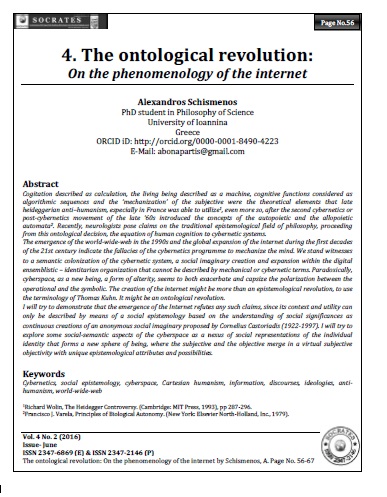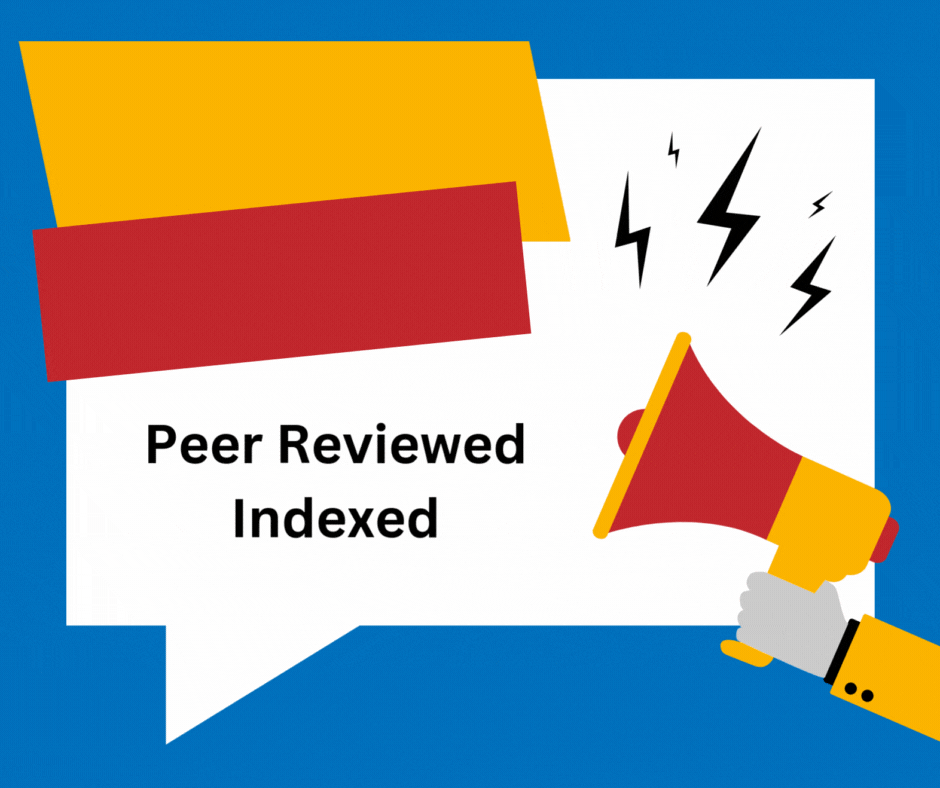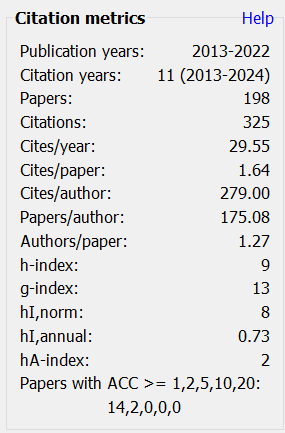The ontological revolution
On the phenomenology of the internet
Keywords:
Cybernetics, social epistemology, cyberspace, Cartesian humanism, information, discourses, ideologies, antihumanism, world-wide-webAbstract
Cogitation described as calculation, the living being described as a machine, cognitive functions considered as algorithmic sequences and the ‘mechanization’ of the subjective were the theoretical elements that late heideggerian anti–humanism, especially in France was able to utilize1, even more so, after the second cybernetics or post-cybernetics movement of the late ‘60s introduced the concepts of the autopoietic and the allopoietic automata2. Recently, neurologists pose claims on the traditional epistemological field of philosophy, proceeding from this ontological decision, the equation of human cognition to cybernetic systems. The emergence of the world-wide-web in the 1990s and the global expansion of the internet during the first decades of the 21st century indicate the fallacies of the cybernetics programme to mechanize the mind. We stand witnesses to a semantic colonization of the cybernetic system, a social imaginary creation and expansion within the digital ensemblistic – identitarian organization that cannot be described by mechanical or cybernetic terms. Paradoxically, cyberspace, as a new being, a form of alterity, seems to both exacerbate and capsize the polarization between the operational and the symbolic. The creation of the internet might be more than an epistemological revolution, to use the terminology of Thomas Kuhn. It might be an ontological revolution. I will try to demonstrate that the emergence of the Internet refutes any such claims, since its context and utility can only be described by means of a social epistemology based on the understanding of social significances as continuous creations of an anonymous social imaginary proposed by Cornelius Castoriadis (1922-1997). I will try to explore some social-semantic aspects of the cyberspace as a nexus of social representations of the individual identity that forms a new sphere of being, where the subjective and the objective merge in a virtual subjective objectivity with unique epistemological attributes and possibilities.
Downloads
Metrics
References
Castoriadis, C. (1984). Crossroads in the Labyrinth, trans. by M.H. Ryle & K. Soper (Cambridge. : MIT Press.
Dupuy, J. (2000). The Mechanization of the Mind: On the Origins of Cognitive Science, trans. M.B. DeBevoise. New Jersey: Princeton University Press.
Varela, F. J. (1979). Principles of Biological Autonomy. New York: Elsevier North-Holland, Inc.
Wiener, N., & Cybernetics, (1948). or control and communication in the animal and the machine. (Paris: Hermann & Cie. Paris: MIT Press.
Wolin, R. (1993). The Heidegger Controversy. Cambridge: MIT Press.

Downloads
Published
How to Cite
Issue
Section
License
Revised Copyright/CC license that applies to all the articles published after 05-02-2017
Attribution-NonCommercial 4.0 International (CC BY-NC 4.0)

Copyright/CC license that applies to all the articles published before 05-02-2017
Attribution-Non Commercial-No Derivatives 4.0 International (CC BY-NC-ND 4.0)

Author(s) will retain all the right except commercial and re-publishing rights. In the case of re-publishing, they will have to obtain written permission from the journal. Additional licensing agreements (Creative Commons licenses) grants rights to readers to copy, distribute, display and perform the work as long as you give the original author(s) credit, they can not use the works for commercial purposes and are not allowed to alter, transform, or build upon the work. For any reuse or distribution, readers and users must make clear to others the license terms of this work. Any of these conditions can be waived if you get permission from the copyright holders. Nothing in this license impairs or restricts the authors’ rights. To view a copy of this license, visit http://creativecommons.org/licenses/by-nc-nd/4.0/ or send a letter to Creative Commons, 171 Second Street, Suite 300, San Francisco, California, 94105, USA.
Research Papers published in SOCRATES are licensed under an Attribution-NonCommercial-NoDerivatives 4.0 International (CC BY-NC-ND 4.0)












